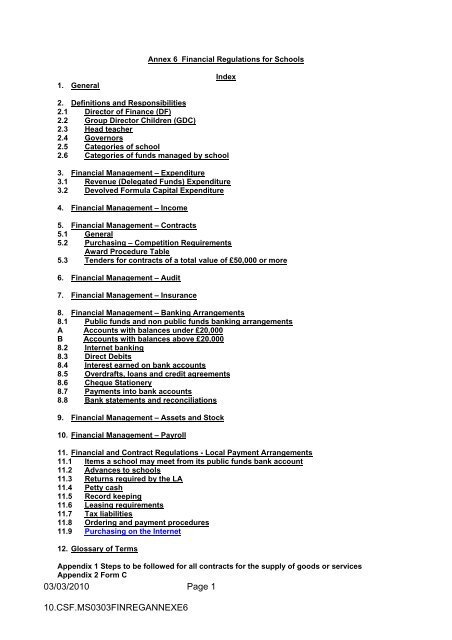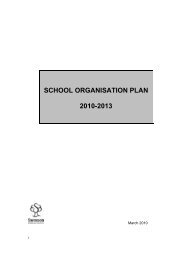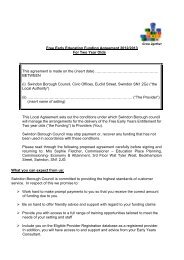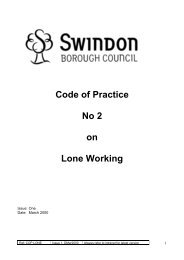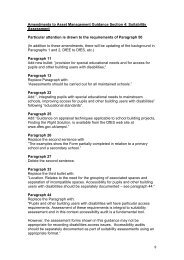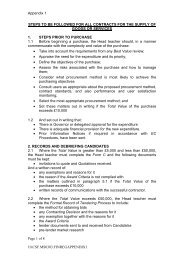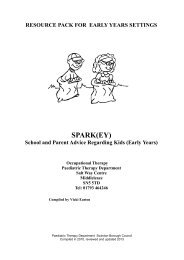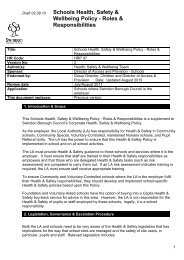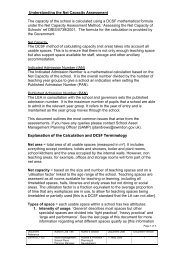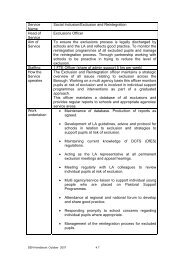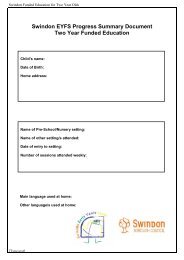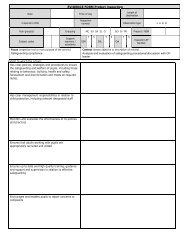Annexe 6 Financial regulations for schools - SchoolsOnline
Annexe 6 Financial regulations for schools - SchoolsOnline
Annexe 6 Financial regulations for schools - SchoolsOnline
Create successful ePaper yourself
Turn your PDF publications into a flip-book with our unique Google optimized e-Paper software.
Annex 6 <strong>Financial</strong> Regulations <strong>for</strong> Schools<br />
1. General<br />
Index<br />
2. Definitions and Responsibilities<br />
2.1 Director of Finance (DF)<br />
2.2 Group Director Children (GDC)<br />
2.3 Head teacher<br />
2.4 Governors<br />
2.5 Categories of school<br />
2.6 Categories of funds managed by school<br />
3. <strong>Financial</strong> Management – Expenditure<br />
3.1 Revenue (Delegated Funds) Expenditure<br />
3.2 Devolved Formula Capital Expenditure<br />
4. <strong>Financial</strong> Management – Income<br />
5. <strong>Financial</strong> Management – Contracts<br />
5.1 General<br />
5.2 Purchasing – Competition Requirements<br />
Award Procedure Table<br />
5.3 Tenders <strong>for</strong> contracts of a total value of £50,000 or more<br />
6. <strong>Financial</strong> Management – Audit<br />
7. <strong>Financial</strong> Management – Insurance<br />
8. <strong>Financial</strong> Management – Banking Arrangements<br />
8.1 Public funds and non public funds banking arrangements<br />
A Accounts with balances under £20,000<br />
B Accounts with balances above £20,000<br />
8.2 Internet banking<br />
8.3 Direct Debits<br />
8.4 Interest earned on bank accounts<br />
8.5 Overdrafts, loans and credit agreements<br />
8.6 Cheque Stationery<br />
8.7 Payments into bank accounts<br />
8.8 Bank statements and reconciliations<br />
9. <strong>Financial</strong> Management – Assets and Stock<br />
10. <strong>Financial</strong> Management – Payroll<br />
11. <strong>Financial</strong> and Contract Regulations - Local Payment Arrangements<br />
11.1 Items a school may meet from its public funds bank account<br />
11.2 Advances to <strong>schools</strong><br />
11.3 Returns required by the LA<br />
11.4 Petty cash<br />
11.5 Record keeping<br />
11.6 Leasing requirements<br />
11.7 Tax liabilities<br />
11.8 Ordering and payment procedures<br />
11.9 Purchasing on the Internet<br />
12. Glossary of Terms<br />
Appendix 1 Steps to be followed <strong>for</strong> all contracts <strong>for</strong> the supply of goods or services<br />
Appendix 2 Form C<br />
03/03/2010 Page 1<br />
10.CSF.MS0303FINREGANNEXE6
Appendix 3 Schools monthly reporting schedule<br />
1. General<br />
Annex 6 - <strong>Financial</strong> Regulations For Schools<br />
1.1 Swindon Borough Council (the “Council”) adopted <strong>Financial</strong> Regulations (the<br />
“Council Regulations”) in April 1997 under The Local Government Act 1972 as amended,<br />
(the “Act”), <strong>for</strong> basic financial rules and guidance to be followed by the Council in its<br />
financial dealings so as to ensure that all such dealings comply with a common standard.<br />
The Regulations do not override the requirement to observe statute law including<br />
European Community (EC) Directives. They apply to all areas of the Council including<br />
<strong>schools</strong> operating under the Devolved Management of Schools Scheme (the “Scheme”).<br />
1.2 The intention of this document is to set the <strong>Financial</strong> Regulations (the<br />
“Regulations”) within a context relevant to <strong>schools</strong> and does not supersede, override or<br />
interpret the Council Regulations, but should be read in conjunction with them together<br />
with the relevant Standing Orders, Duties and Powers and Authorisations of the Council<br />
and also the Scheme and Council Policies, currently in <strong>for</strong>ce, copies of which are held by<br />
<strong>schools</strong>.<br />
1.3 It is a requirement that these Regulations shall be complied with by all <strong>schools</strong><br />
operating under the Scheme (see Section 3.2.1.1), such compliance to be the subject of<br />
Internal Audit within the framework specified in Annex 5.<br />
1.4 Any exceptions or amendments to the Regulations or associated procedures<br />
thereto must be authorised by the Director of Finance (DF) as defined in Section 2.1<br />
below, and be the subject of consultation with <strong>schools</strong>.<br />
1.5 The Regulations will apply to all types of funds received and held by <strong>schools</strong>.<br />
1.6 All aspects of the financial arrangements within <strong>schools</strong> should be subject to full<br />
and proper documentation. Schools will document internal procedures under the<br />
Regulations to <strong>for</strong>m a <strong>Financial</strong> Procedures Manual (the “Manual”).<br />
1.7 The Manual will be approved by each school’s governing body and a copy of the<br />
Manual must be available to the Group Director Children (GDC) as defined in Section 2.2<br />
below, upon request. The Manual will be made available in <strong>schools</strong> to all staff involved in<br />
the School's accounting and computer systems.<br />
1.8 Alternatively school governing bodies may adopt the Local Authority (LA) Schools<br />
<strong>Financial</strong> Procedures Manual (the “LA Manual”), which will set out in full, requirements and<br />
recommendations <strong>for</strong> school financial systems, and procedures.<br />
03/03/2010 Page 2<br />
10.CSF.MS0303FINREGANNEXE6
2. Definitions and Responsibilities<br />
2.1 Director of Finance (DF)<br />
(a) "Chief <strong>Financial</strong> Officer" refers to the Officer appointed under Section 151 of the<br />
Local Government Act 1972 as the Officer with responsibility <strong>for</strong> the proper administration<br />
of the Council's financial affairs. In Swindon Borough Council this is the Director of<br />
Finance.<br />
(b)<br />
In order that he/she may fulfil these statutory obligations:<br />
(i) The DF may issue such accounting and financial system instructions, as<br />
he/she considers necessary<br />
(ii)<br />
agreement<br />
No financial procedure or system shall be implemented without his/her<br />
(iii) Schools shall maintain such financial records, procedures and in<strong>for</strong>mation as<br />
he/she may require and as may be required by other appropriate regulatory bodies<br />
(iv) The DF is responsible <strong>for</strong> the production and distribution of financial<br />
management in<strong>for</strong>mation to the Council and Cabinet, Sub-Committees, Panels, working<br />
parties and other similar bodies of the Council, and Heads shall supply him/her with any<br />
details requested <strong>for</strong> this purpose<br />
(v) <strong>Financial</strong> statements under the School Standards and Framework Act shall<br />
be provided by the DF and will show <strong>for</strong> each school actual spending against school<br />
budget share in the preceding financial year. The statements will also provide details of<br />
spending on non-delegated items of expenditure e.g. capital, transport of pupils<br />
2.2 Group Director Children (GDC)<br />
"Chief Officer" refers to an officer who is directly responsible to the Council <strong>for</strong> a service or<br />
group of services, and any officer to whom the Chief Officer has delegated any duties in<br />
respect of these <strong>regulations</strong>. Chief Officers are individually responsible <strong>for</strong> the proper<br />
financial management of resources allocated to their operational areas through the budget<br />
making process, and <strong>for</strong> the identification of all income arising from activities within those<br />
areas. This responsibility includes the accountability <strong>for</strong> and control of staff, and the<br />
security, custody and management of assets including plant, equipment, buildings,<br />
materials, cash and stores. Each Chief Officer shall devise and implement such controls<br />
and procedures in accordance with 2.1(b)(ii) above as may be necessary to discharge this<br />
responsibility and shall ensure that their staff are aware of and comply with the<br />
requirements of these <strong>regulations</strong> and any procedure notes issued in accordance with<br />
them.<br />
The Group Director Children has the status of Chief Officer <strong>for</strong> the Children Services<br />
Department of Swindon Borough Council.<br />
2.3 Head teacher<br />
For the purpose of these Regulations only a Head teacher shall be regarded as a Chief<br />
Officer and is also referred to as an Accounting officer in the Scheme. Head teachers will<br />
exercise the responsibilities delegated to them in accordance with the provisions of<br />
03/03/2010 Page 3<br />
10.CSF.MS0303FINREGANNEXE6
paragraph 2.2 above and within the terms of the Scheme and the School Teachers' Pay<br />
and Conditions Document.<br />
(a) (i) Each Head teacher is responsible <strong>for</strong> the observance of these Regulations<br />
within the school, <strong>for</strong> the security of resources and assets and <strong>for</strong> the compliance and<br />
accountability of staff with accounting and financial system instructions and procedures<br />
referred to within the Regulations. Where the Head teacher employs a consultant or<br />
external contractor to undertake any function, which might otherwise be undertaken by a<br />
direct employee of the Council, it is the responsibility of the Head teacher to ensure that<br />
the individual acts in accordance with these <strong>regulations</strong> and is aware of responsibilities.<br />
(ii) Each Head teacher is responsible <strong>for</strong> monitoring and controlling the financial<br />
per<strong>for</strong>mance of the school and <strong>for</strong> reporting to the governing body, and if required to the<br />
Local Authority (LA) in a <strong>for</strong>mat required by the LA, on per<strong>for</strong>mance. The DF will provide<br />
appropriate financial services and systems to assist Head teachers in fulfilling these<br />
responsibilities.<br />
(iii) Head teachers shall comply with timetables <strong>for</strong> the production of financial<br />
and other related documents set by the DF.<br />
(vi) Head teachers shall allow at all reasonable times the DF staff access to the<br />
financial and other related documents and records under their control.<br />
2.4 Governors<br />
The status and responsibilities of governors will be as defined in the School Standards<br />
and Framework Act 1998 as amended by subsequent Education Acts and are referred to<br />
in the Governors' Guide to the Law <strong>for</strong> definition of those responsibilities and in the<br />
Scheme <strong>for</strong> their financial responsibilities. Delegation of the management of the duties of<br />
Governors, which should include designation of members of staff as authorised<br />
signatories, will be defined within each individual school's Governors Scheme of<br />
Delegation, which must comply with DCSF Regulations.<br />
2.5 Categories of School<br />
Categories of <strong>schools</strong> are defined in The School Standards and Framework Act 1998.<br />
The main differences between the categories of school reflect the share of responsibilities<br />
between LA, governors and trustees (where appropriate).<br />
Community<br />
Foundation<br />
Voluntary<br />
Controlled<br />
LA is <strong>for</strong>mal employer, landowner and admissions authority<br />
Governing body is <strong>for</strong>mal employer, admissions authority and<br />
Landowner, unless that is the trustees<br />
LA is <strong>for</strong>mal employer and admissions authority, and trustees are the<br />
landowner<br />
Voluntary Aided<br />
Governing body is <strong>for</strong>mal employer and admissions authority, trustees<br />
are the landowner, and the governors contribute towards the school's<br />
capital costs<br />
03/03/2010 Page 4<br />
10.CSF.MS0303FINREGANNEXE6
Academy<br />
Academies are publicly funded independent <strong>schools</strong> with sponsors<br />
from the private or voluntary sectors or from churches or other faith<br />
groups. An Academy is set up as a company limited by guarantee<br />
with charitable status and will have a board of governors responsible<br />
<strong>for</strong> the governance and strategic leadership of the school. As such<br />
these <strong>Financial</strong> Regulations do not apply.<br />
The differing responsibilities <strong>for</strong> the differing categories of <strong>schools</strong> under these <strong>Financial</strong><br />
Regulations are denoted within the relevant sections.<br />
2.6 Categories of funds managed by <strong>schools</strong><br />
2.6.1 Public Funds<br />
(i) Funds distributed to maintained <strong>schools</strong> within the requirements of the<br />
School Standards and Framework Act, which are delegated or devolved to the governing<br />
body subject to the provisions contained within the Scheme. Public funds include funding<br />
deriving from the Dedicated Schools Grant, Standards Fund grants, government initiatives<br />
and capital funding either delegated or devolved via the LA.<br />
(ii) Sponsorship, grants or other similar finance initiatives deriving from a private<br />
or charitable source (other than private individuals) provided <strong>for</strong> revenue or capital<br />
purposes are to be administered and accounted <strong>for</strong> in the same manner as public funds<br />
and any benefit from such funds becomes the property of the LA.<br />
2.6.2 Non Public Funds<br />
(i) School Fund, being those funds from a non-public source i.e. private<br />
individuals under the direct control of the governing body used by the school <strong>for</strong><br />
education-related purposes, are required to be managed to the same standard and with<br />
the same level of control as that of public funds. School funds are subject to internal audit<br />
requirements referred to in this document and goods purchased from a school fund<br />
become the property of the LA.<br />
(ii) Charitable Funds, held <strong>for</strong> the benefit of the school with governors and/or<br />
staff as trustees and registered with the Charity Commission, should be operated within<br />
their <strong>regulations</strong> and separately from any other school fund, although governors and<br />
school employees may be trustees. Charities are not subject to these Regulations except<br />
that a certificate of con<strong>for</strong>mity as and when submitted to the Charities Commission is<br />
required by the LA. Assets of charitable funds are the property of the charity unless<br />
<strong>for</strong>mally gifted to the school.<br />
(iii) Parent Teacher Association or similar funds should be operated as a<br />
separate fund from any other school fund and are not subject to these Regulations. As<br />
such they should not be operated during working time paid <strong>for</strong> from public funds. They<br />
should be operated to the same financial standard as any other public or non-public fund.<br />
03/03/2010 Page 5<br />
10.CSF.MS0303FINREGANNEXE6
3. <strong>Financial</strong> Management – Expenditure<br />
3.1 Revenue (Delegated Funds) Expenditure<br />
3.1.1 Head teachers shall prepare a system of budgetary control within the School's<br />
scheme of delegation including the identification of cost centre managers and the limits of<br />
their budgetary authority and ensure its en<strong>for</strong>cement.<br />
3.1.2 Schools will prepare, with guidance (subject to buyback) from the GDC and the DF,<br />
a budget of income and expenditure within the resources delegated to them, in<br />
accordance with a timetable agreed with the above Officers.<br />
3.1.3 No school shall plan its net expenditure to exceed the approved budget, except<br />
with the specific approval of the GDC, who shall consult the DF.<br />
3.1.4 After the budget has been agreed by the governing body, Head teachers must<br />
report to the GDC and the DF the allocation of funds across budget headings determined<br />
from time to time by the DF, by the date determined annually by the DF. The right is<br />
reserved by the LA to take appropriate action where <strong>schools</strong> do not comply with this<br />
requirement following discussion with and appropriate notice to the school.<br />
3.1.5 Where works to the premises are undertaken from the revenue budget, Foundation<br />
and Voluntary Aided Schools are requested, and Community and Voluntary Controlled<br />
Schools are required, to comply with the provisions in 3.2.3 (a) to (f) below.<br />
3.1.6 Monthly monitoring of expenditure against budget allocations should be carried out<br />
and reported to the governors. The Group Finance Manager, Children Services should be<br />
notified at the first instance where overspent budget allocations mean a deficit balance at<br />
year-end is <strong>for</strong>ecast.<br />
3.2 Devolved Formula Capital Expenditure<br />
3.2.1 Devolved Formula Capital Guidance Pack, containing guidance, <strong>for</strong>ms and the<br />
process was sent to all <strong>schools</strong> April 2008.<br />
3.2.2 The de-minimus value is £1,000, all expenditure under this is regarded as Revenue<br />
expenditure.<br />
3.2.3 Where <strong>schools</strong> propose to undertake capital projects from accumulated revenue<br />
funds, they may do so but Foundation and VA Schools are requested, and Community<br />
and Controlled Schools are required, to seek the advice be<strong>for</strong>ehand of the Director,<br />
Access and Provision (DAAP) who will consult other officers as appropriate:<br />
(a) Full design details, technical parameters and calculations where necessary, are to<br />
be submitted <strong>for</strong> approval, to ensure that Health and Safety and also all statutory<br />
requirements are complied with and that the proposed works do not compromise the<br />
existing buildings or the electrical and mechanical services therein.<br />
(b) All work must comply with all current statutory requirements, Health and Safety<br />
legislation, British Standards, IEE and CIBSE guides etc.<br />
03/03/2010 Page 6<br />
10.CSF.MS0303FINREGANNEXE6
(c) A suitably qualified and professionally indemnified registered Incorporated Engineer<br />
should undertake Electrical and Mechanical design work.<br />
(d) Installation work and servicing should only be undertaken by officially registered<br />
organisations i.e. HVCA, ACOP, CORGI, NACOS, NICEIC etc. with appropriately trained<br />
and/or licensed personnel.<br />
(e) The LA is to be in<strong>for</strong>med when the works are programmed to be undertaken so that<br />
site inspections can be arranged if required and necessary amendments to SCAMP<br />
drawings can be undertaken.<br />
(f) Upon completion working drawings along with full commissioning and test<br />
certificates are to be held by the school to be available to the LA <strong>for</strong> inspection if required.<br />
If any aspects fail to meet the required technical parameters the school shall arrange to<br />
rectify the work to the satisfaction of the LA. Further guidance is included in the Premises<br />
Guidance document and Premises Log Book.<br />
3.2.4 This clause relates to capital bids, grants, lottery board funds, private finance<br />
initiatives and public private partnerships where a capital bid is made and/or capital<br />
funding received by a school from agencies other than the Council.<br />
(i) All <strong>schools</strong> must advise the DAAP of the plan to submit a bid, the purpose of<br />
the bid, the amount to be bid <strong>for</strong> and the source of any finances, which support the bid<br />
prior to the bid being submitted.<br />
(ii) Foundation and voluntary aided <strong>schools</strong> are requested, and community and<br />
voluntary controlled <strong>schools</strong> are required, to submit a full copy of the bid together with a<br />
financial and development plan in support to the DAAP.<br />
(iii) No application <strong>for</strong> a bid may take place until the school has complied with (i)<br />
and (ii) above and written agreement has been received from the DAAP that the<br />
application may proceed.<br />
(iv) All <strong>schools</strong> have the facility to obtain external funding from a variety of<br />
sources using ‘BidTrack’. The External Funding Officer will support <strong>schools</strong> in this<br />
endeavour. Schools should still comply with (i) and (ii) above and obtain written<br />
permission be<strong>for</strong>e proceeding with any bid project.<br />
(v) All bid applications must con<strong>for</strong>m with the Scheme and these financial<br />
<strong>regulations</strong> including having regard to Best Value.<br />
03/03/2010 Page 7<br />
10.CSF.MS0303FINREGANNEXE6
4. <strong>Financial</strong> Management – Income<br />
4.1 The arrangements <strong>for</strong> the collection of all money due to the Council shall be in<br />
accordance with <strong>regulations</strong> set by the DF.<br />
4.2 Head teachers are responsible <strong>for</strong> the proper collection of and accounting <strong>for</strong> all<br />
other income receivable and received.<br />
4.3 Head teachers shall promptly render accounts <strong>for</strong> the recovery of income, including<br />
that derived from letting school premises.<br />
4.4 No debt shall be discharged other than by payment in full or being written-off. The<br />
Head Teacher should approve the writing off of debts up to a value to be agreed by the<br />
governing body and noted within the Governors Scheme of Delegation. Debts over that<br />
value should be approved <strong>for</strong> writing off by resolution of the governing body. The LA<br />
should be advised annually of the total value of debts written off in this way by each<br />
school promptly after the close of the financial year<br />
4.5 All staff receiving monies shall give an official receipt <strong>for</strong> all income transactions<br />
over £10, or when requested by the payee. All income collected shall be paid, intact, into<br />
the appropriate bank account, at least <strong>for</strong>tnightly or more frequently as determined by the<br />
Insurance levels of the safe. Income collected should be recorded in the school’s financial<br />
management system (SIMS) promptly.<br />
4.6 Each member of staff who receives money on behalf of the Borough Council shall<br />
keep an accurate and chronological account of all monies received and thereafter paid to<br />
the appropriate bank account. This should also include details of payments received by<br />
BACS.<br />
4.7 No third party or personal cheques shall be cashed out of any official monies of the<br />
Council.<br />
4.8 The governors should have a Charging and Remissions Policy. The Head teacher<br />
should prepare a report to the governors on cost of activities charged <strong>for</strong> when<br />
considering a variation to the policy. The cost of activities to be charged <strong>for</strong> should be<br />
assessed and charges set and approved by governors.<br />
4.9 Income received other than that due to the Council must be properly accounted <strong>for</strong><br />
to the same accounting standards as that due to the Council. Receipts must be provided<br />
<strong>for</strong> all income in excess of £10 or when requested by the payee.<br />
4.10 Income received as a result of a <strong>for</strong>mal bid to or sponsorship from an agency other<br />
than the Council must be accounted <strong>for</strong> as if the money were public funds through the<br />
school's SIMS or similar accounting system.<br />
4.11 Schools must ensure that there is sufficient separation of accounts to enable<br />
differentiation between public and non-public income.<br />
03/03/2010 Page 8<br />
10.CSF.MS0303FINREGANNEXE6
5. <strong>Financial</strong> Management – Contracts<br />
5.1 General<br />
5.1.1 The following requirements apply to all contracts <strong>for</strong> the supply of goods or services<br />
to or by the school other than contracts of employment.<br />
5.1.2 In relation to “Works Contracts” and “Functional Work” as defined in the Local<br />
Government (Planning and Land) Act 1980 and the Local Government Act 1988 or any<br />
further legislation, the additional provisions of the legislation will apply.<br />
5.1.3 All contracts entered into by <strong>schools</strong> should be in accordance with the Best Value<br />
Principles contained in Annex 4 to the Scheme.<br />
5.1.4 Contracts should be undertaken within the framework of the school's own<br />
Governors' Scheme of Delegation. Where there is conflict between the Governors'<br />
Scheme of Delegation and these financial <strong>regulations</strong>, the financial <strong>regulations</strong> will apply.<br />
5.1.5 Appendix 1 provides detailed steps to be followed <strong>for</strong> contracts <strong>for</strong> the supply of<br />
goods or services. Appendix 2 Form C provides a <strong>for</strong>mal record of the quotations and<br />
tendering process carried out.<br />
5.2 Purchasing – Competition Requirements<br />
5.2.1 Where the Total Value <strong>for</strong> a purchase is within the values in the first column below,<br />
at minimum the Award Procedure in the second column must be followed. The persons<br />
specified in the third column shall undertake short listing.<br />
5.3 Tenders - <strong>for</strong> contracts of a total value of £50,000 or more<br />
5.3.1 Three tenders must be sought <strong>for</strong> contracts of which a total value amounts to more<br />
than £50,000. Be<strong>for</strong>e tender documents are issued to prospective tenderers, where they<br />
are in other than a standard <strong>for</strong>m, they should first be submitted to the Director of Finance<br />
<strong>for</strong> advice. All contracts exceeding £100,000 should be in writing in a <strong>for</strong>m approved by<br />
the Director of Law and Corporate Governance.<br />
03/03/2010 Page 9<br />
10.CSF.MS0303FINREGANNEXE6
Award procedure table<br />
Total Value Award Procedure Short listing<br />
Up to £4,999.99<br />
Quotations in writing should be<br />
obtained <strong>for</strong> purchases and it is<br />
recommended that more than one<br />
written quotation be obtained if<br />
reasonably practicable. However, if<br />
the value of the purchase is<br />
estimated as not likely to exceed<br />
£100, then at least one oral<br />
quotation will suffice. Schools must<br />
be able to demonstrate both Best<br />
Value and probity in the process.<br />
Existing contractual arrangements<br />
must be used if they are in place. *<br />
£5,000-£50,000 At least three written Quotations<br />
against pre-determined<br />
specification *<br />
As per school<br />
Governors Scheme of<br />
Delegation<br />
As per school<br />
Governors Scheme of<br />
Delegation<br />
£50,000.01-EC<br />
Threshold1<br />
Invitation to Tender by<br />
Advertisement / List to at least<br />
three suppliers *<br />
As per school<br />
Governors Scheme of<br />
Delegation<br />
Above EC<br />
threshold<br />
EC Procedure or, where this does<br />
not apply, Invitation to Tender by<br />
Advertisement/List to at least five<br />
suppliers *<br />
Seek advice from<br />
Council Procurement<br />
Section<br />
* Where only one supplier is available <strong>for</strong> specialist equipment the school should<br />
document that this is the case and make reasonable ef<strong>for</strong>ts to obtain quotes from other<br />
suppliers.<br />
1 EC Threshold is £139k <strong>for</strong> Goods & Services and £3.49m <strong>for</strong> Building Works<br />
03/03/2010 Page 10<br />
10.CSF.MS0303FINREGANNEXE6
6. <strong>Financial</strong> Management – Audit<br />
6.1 Regulations relating to Audit are contained in Section 2.2.6 to 2.2.8 of the Scheme,<br />
which include a requirement to provide a certificate of audit of non-public funds.<br />
6.2 Audit of charities of which a school is a beneficiary is to be carried out under<br />
Charity Commission requirements.<br />
6.3 The Accounts and Audit Regulations 1996 (SI 1996/590), regulation 5, require that<br />
a “relevant body shall maintain an adequate and effective system of internal audit of their<br />
accounting records and control systems”.<br />
6.4 Accordingly, internal audit is an independent and objective appraisal function<br />
established by the authority <strong>for</strong> reviewing the system of internal control. It examines,<br />
evaluates and reports on the adequacy of internal control as a contribution to the proper,<br />
economic, efficient and effective use of resources.<br />
The following is required:<br />
• To ensure that internal auditors are given access at all reasonable times to<br />
premises, personnel, documents and assets that the auditors consider necessary<br />
<strong>for</strong> the purposes of their work.<br />
• To ensure that auditors are provided with any in<strong>for</strong>mation and explanations that<br />
they seek in the course of their work.<br />
• To consider and respond promptly (within two working weeks of receipt of the draft<br />
report) to recommendations in audit reports.<br />
• To ensure that any agreed actions arising from audit recommendations are carried<br />
out in a timely and efficient fashion and in line with the timescale agreed with the<br />
Head of Internal Audit.<br />
• To notify the Section 151 Officer and Head of Internal Audit immediately of any<br />
suspected fraud, theft, irregularity, improper use or misappropriation of the<br />
authority’s property or resources. Pending investigation and reporting, the School<br />
should take all necessary steps to prevent further loss and to secure records and<br />
documentation against removal or alteration.<br />
• To ensure that new systems <strong>for</strong> maintaining financial records, or records of assets,<br />
or changes to such systems, are discussed with and agreed by the Section 151<br />
Officer prior to implementation.<br />
7. <strong>Financial</strong> Management - Insurance<br />
7.1 Insurance Legal Requirements<br />
There are several areas of insurance where cover must be in <strong>for</strong>ce -<br />
a) Employer's Liability. This class of insurance provides cover in respect of injury or<br />
illness to any employee arising out of the course of their occupation. In order <strong>for</strong> a claim to<br />
succeed the claimant must prove that the employer has been negligent. The minimum<br />
legal limit of indemnity is £5,000,000 any one claim.<br />
03/03/2010 Page 11<br />
10.CSF.MS0303FINREGANNEXE6
) Engineering Inspection. Any item of lifting equipment or any item of steam<br />
equipment must be inspected. The frequency of inspection depends upon the item and is<br />
usually every 6 months or 12 months. Insurers will issue a certificate confirming the item<br />
has been inspected and this will show whether any defects have been found<br />
c) Motor. Any motor vehicle must have at least Third Party Insurance.<br />
7.2 Insurance Cover<br />
Swindon Borough Council arranges cover <strong>for</strong> those <strong>schools</strong>, which have elected to be<br />
included under the Council's insurance arrangements. The areas covered are Public<br />
Liability <strong>for</strong> all Staff and Governors; Employers Liability/Personal Accident to Employees,<br />
Volunteers & Work Experience Students; Fidelity Guarantee; Third Party Hirers Liability;<br />
Officials Indemnity and Engineering insurances, arranged under a 'combined policy'.<br />
School Travel / Personal Accident cover is arranged under a separate policy.<br />
8. <strong>Financial</strong> Management - Banking Arrangements<br />
8.1 Public Funds and Non Public Funds banking arrangements<br />
8.1.1 Schools may not open bank accounts or make investments outside of this<br />
guidance. A school's choice of bank will depend on the level of balances it wishes to hold<br />
in its account: <strong>schools</strong> with balances of under £20,000 may follow the requirements of<br />
options A or B; <strong>schools</strong> with balances of over £20,000 must follow option B. Investments<br />
must be in any current or deposit account, which include managed money market<br />
accounts providing that the bank provides a written agreement incorporating a guarantee<br />
of the capital sum invested. Schools should note that option A may not be suitable <strong>for</strong><br />
public funds accounts due to the level of budget share paid into the account.<br />
A. Accounts with balances under £20,000<br />
Schools are free to invest with any authorised UK bank or building society, provided that<br />
their balances do not exceed £20,000 at any one time in order to take advance of the UK<br />
Deposit Protection Scheme or the Building Societies Investor Protection Scheme (NB this<br />
figure is calculated as the sum of all accounts held, including both current and deposit<br />
accounts)<br />
A List of authorised banks is held and should be checked with the Council Treasury<br />
Section prior to opening an account:<br />
It should be noted that inclusion on this list does not mean that these institutions will offer<br />
services suitable <strong>for</strong> <strong>schools</strong>. In each case the suitability of an individual account should<br />
be carefully assessed.<br />
B. Accounts with balances above £20,000<br />
The Council restricts its investment to institutions, which have been independently<br />
assessed as presenting the lowest possible level of risk. An up to date list of suitable<br />
institutions is available from the Council Treasury Section. However, it should be noted<br />
that many of the institutions might be unlikely to deal with the amounts that <strong>schools</strong> have<br />
to invest.<br />
03/03/2010 Page 12<br />
10.CSF.MS0303FINREGANNEXE6
8.1.2 All arrangements with the Council’s bankers concerning the operation and<br />
supervision of the Council’s banking accounts, overdraft facilities and the ordering,<br />
custody and use of cheques, shall be made by the DF.<br />
8.1.3 Where bank accounts are set up with the authorisation of the DF they shall bear the<br />
signatures of two appropriate officers. The authorised signatories may also alter cheques<br />
drawn on the bank account.<br />
8.2 Internet Banking<br />
8.2.1 A number of financial institutions have recently started to offer their services on the<br />
Internet. However <strong>schools</strong> are only permitted to operate the ‘read only’ facility on these<br />
accounts.<br />
8.3 Direct Debits<br />
8.3.1 Schools may be requested to set up direct debit arrangements in favour of the<br />
Council <strong>for</strong> specified items.<br />
8.3.2 Schools may enter into direct debit arrangements <strong>for</strong> payment of accounts with<br />
other agencies or companies. Schools are advised to ensure that adequate safeguards<br />
are in place when setting up electronic transfers from school bank accounts, particularly<br />
direct debit arrangements. Advice is available from the Council.<br />
8.4 Interest earned on bank accounts<br />
8.4.1 The <strong>schools</strong> will retain the interest earned on their accounts and bear any charges<br />
made by their bank.<br />
8.4.2 Because of the tax status of the Council, interest should be paid gross without<br />
deduction of tax. If interest is paid net, a tax deduction certificate should be obtained if<br />
possible and, to obtain a reimbursement, this must be sent to the Schools Finance Team.<br />
8.4.3 There is a loss of interest to the Council because advances are made to the<br />
<strong>schools</strong> earlier than invoices and payroll costs would historically have been paid. This<br />
loss is made good by deducting an equivalent sum from the amounts advanced to <strong>schools</strong><br />
and is known as Abatement. The deduction from individual <strong>schools</strong> will be made prior to<br />
the advance of their budget shares and will be pro-rata to their advances, such deduction<br />
depending on current interest rates at the time of the advance (being the current 7 day<br />
rate). Schools will be notified of the rate applicable to each advance prior to the beginning<br />
of the financial year. Abatement will not be deducted from the amount paid to <strong>schools</strong> <strong>for</strong><br />
rates.<br />
8.5 Overdrafts, Loans and credit agreements<br />
8.5.1 Schools MUST NOT themselves offer any security to any bank or other financial<br />
institution.<br />
8.5.2 Schools MUST NOT make arrangements <strong>for</strong> overdrafts, loans or any other <strong>for</strong>m of<br />
credit or deferred purchases, which includes interest free credit facilities.<br />
03/03/2010 Page 13<br />
10.CSF.MS0303FINREGANNEXE6
8.6 Cheque Stationery<br />
8.6.1 Schools will order from their banks their own cheques. They can be available in<br />
continuous stationery in which case they should be designed to match the printing <strong>for</strong>mat<br />
of SIMS.<br />
8.6.2 Cheques may be personalised (<strong>for</strong> example with a school crest) but Swindon<br />
Borough Council or SBC MUST appear on the title of the account into which the school<br />
budget share is paid, e.g. SBC…......School.<br />
8.6.3 Cheques MUST be signed in manuscript by two members of staff who are<br />
authorised signatories. If at all possible they should not be the same staff that authorise<br />
orders or certify accounts <strong>for</strong> payment. Governors who are not members of staff may not<br />
be authorised signatories but <strong>schools</strong> may put in place a procedure whereby governors<br />
provide a third signature <strong>for</strong> amounts above a level determined in their Scheme of<br />
Delegation.<br />
8.6.4 Blank cheques MUST NOT be pre-signed and they MUST be kept in a secure,<br />
locked place, preferably a safe. A record of blank cheques held should be kept.<br />
8.6.5 Cash dispensers MUST NOT be used.<br />
8.6.6 Any cheque, which requires cancellation, MUST be clearly marked “CANCELLED”<br />
and retained <strong>for</strong> audit with the counterfoils.<br />
8.6.7 If a school produces any cheques manually, SIMS and other financial systems must<br />
be updated <strong>for</strong> the payment immediately.<br />
8.7 Payment into bank accounts<br />
8.7.1 Paying-in books, not individual slips, should be used <strong>for</strong> banking income. Where<br />
cheques are paid in, a record MUST be kept showing, <strong>for</strong> each cheque, the name of the<br />
drawer, the nature of the income and the amount, and this MUST be totalled to agree with<br />
the total cheques banked.<br />
8.7.2 Where no paying-in book is used, as with a building society passbook, a manual<br />
record must be kept providing the same details as a paying-in book would have provided.<br />
8.7.3 The Bank MUST accept cheques payable to SBC…School without endorsement.<br />
8.8 Bank statements and reconciliations<br />
8.8.1 The school should receive bank statements at least monthly.<br />
8.8.2 Schools MUST reconcile at least monthly the balance shown on the bank statement<br />
with the school account as shown on SIMS or other financial system.<br />
8.8.3 Bank reconciliation statements should be dated and signed by an authorised<br />
signatory and the person completing the reconciliation as to their accuracy.<br />
03/03/2010 Page 14<br />
10.CSF.MS0303FINREGANNEXE6
8.8.4 The Schools Finance Team MUST be sent copy statements of all bank balances at<br />
31 December and 31 March each year, together with a signed copy of the bank<br />
reconciliation statement at that date.<br />
9. <strong>Financial</strong> Management – Assets and Stock<br />
9.1.1 Head teachers shall be responsible <strong>for</strong> the custody and physical control of the<br />
assets and stock in their establishment, <strong>for</strong> ensuring that these do not exceed reasonable<br />
requirements, and that accurate and complete records are maintained.<br />
9.1.2 Schools are required to maintain an inventory of its moveable assets above £1,000<br />
in value in a <strong>for</strong>m determined by the Council. Inclusion in the inventory is required to<br />
substantiate insurance claims, such inventory to be retained in a secure lockable cabinet<br />
or safe and a copy of the inventory should be held off site.<br />
9.1.3 Schools must keep a register <strong>for</strong> items below £1,000 in line with guidance issued<br />
by the Council, such register to be retained in a secure lockable cabinet or safe or held off<br />
site. The register should include the list of furniture and equipment in a basic classroom<br />
and a room-by-room list of all additional items, to substantiate insurance claims.<br />
9.1.4 Schools should set out the authorisation procedures <strong>for</strong> disposal of assets in the<br />
school’s governing body’s Disposal of Assets and Write off policy.<br />
9.2 Head teachers shall agree with the governing body, adjustments to stock records<br />
arising from stocktaking. Head teachers should report to the governing body if the value<br />
of such adjustments exceeds the limit previously agreed by it.<br />
9.3 No surplus stock or other property of the Council shall be sold to any member of the<br />
staff of the Council without the specific approval in each particular case of the governing<br />
body as per the school’s governing body’s Disposal of Assets and Write off policy.<br />
9.4 Schools are allowed to retain the proceeds of sale of assets except in cases where<br />
the asset was purchased with non-delegated funds (in which case it should be <strong>for</strong> the LA<br />
to decide whether the school should retain the proceeds), or the asset concerned is land<br />
or buildings <strong>for</strong>ming part of the school premises and is owned by the LA.<br />
9.5 Proposals <strong>for</strong> the disposal of land and buildings by governing bodies of controlled,<br />
aided and foundation <strong>schools</strong> are required to be notified to the GDC and the Secretary of<br />
State.<br />
9.6 The DF shall be entitled to check stock and be supplied with any in<strong>for</strong>mation<br />
required <strong>for</strong> the accounting, costing and financial records of the Council.<br />
10. <strong>Financial</strong> Management - Payroll<br />
10.1 The employing body shall be responsible <strong>for</strong> making arrangements <strong>for</strong> the payment<br />
of all salaries, wages, compensation or other emoluments to employees or <strong>for</strong>mer<br />
employees.<br />
03/03/2010 Page 15<br />
10.CSF.MS0303FINREGANNEXE6
10.2 The employer in community and controlled <strong>schools</strong> is the Council with the<br />
responsibilities of the employing body being delegated to the governing body. In<br />
foundation and voluntary aided <strong>schools</strong> the employer and the employing body is the<br />
governing body.<br />
10.3 The Head teacher shall be responsible <strong>for</strong> the management of all employees and<br />
shall ensure that the agency responsible <strong>for</strong> the school's payroll is notified of all<br />
appointments, resignations, absences or any other circumstances affecting the<br />
remuneration of such employees.<br />
10.4 The Head teacher is responsible <strong>for</strong> the accurate completion and certification of<br />
individual timesheets and bonus authorisation <strong>for</strong> those employees <strong>for</strong> whom such<br />
payment methods are applicable and <strong>for</strong> the delivery of such timesheets to the relevant<br />
payroll agency in accordance with the prepared timetable. Timesheets must record the<br />
hours and minutes to be paid <strong>for</strong> normal time, overtime, holidays and sickness with any<br />
enhancements or other rates of pay and any payment <strong>for</strong> additional allowances.<br />
10.5 The Head teacher shall be responsible <strong>for</strong> the authorisation of all returns <strong>for</strong> overtime<br />
worked, sickness absences, mileage claims and any payment <strong>for</strong> additional allowances <strong>for</strong><br />
each of their salaried employees and <strong>for</strong> the delivery of such returns to the relevant payroll<br />
agency in accordance with the prepared timetable.<br />
10.6 No school employee may be paid any monies by the school <strong>for</strong> any purpose other<br />
than through the recognised payroll agency <strong>for</strong> the school, except as reimbursement <strong>for</strong><br />
minor expenditure on educational items to be recorded through the school's petty cash<br />
system, the limits of which will be determined in the School's Scheme of Delegation.<br />
10.7 Schools who do not purchase the Council's payroll service are responsible <strong>for</strong> the<br />
correct declaration of the their employees tax and national insurance including payments<br />
in kind e.g. use of a telephone. Such <strong>schools</strong> are required to comply with the Council's<br />
request <strong>for</strong> in<strong>for</strong>mation to enable it to administer those items (e.g. teachers' pensions) <strong>for</strong><br />
which it has statutory duties.<br />
11. <strong>Financial</strong> and Contract Regulations - Local Payment Arrangements<br />
(Note - Throughout “bank” has been used to mean “financial institution”)<br />
11.1 Items a school may meet from its public funds bank account<br />
11.1.1 It can meet:<br />
ALL expenditure both capital and revenue included in delegated and devolved budgets<br />
subject to the requirements contained within this Scheme;<br />
ALL expenditure resulting from income received from grant funding or otherwise which is<br />
required to be paid into the public fund account <strong>for</strong> reporting purposes.<br />
11.1.2 It MUST NOT meet:<br />
ANY excepted items listed in the statutory Scheme;<br />
ANY items relating to non-public (voluntary) funds except lettings and other premises<br />
income <strong>for</strong> VA <strong>schools</strong>;<br />
03/03/2010 Page 16<br />
10.CSF.MS0303FINREGANNEXE6
ANY non-LA private activities; except activities funded otherwise than by the LA which are<br />
the responsibility of the governing body, <strong>for</strong> example extended school activities;<br />
School trips taking place during school holidays that cannot be attributed to the curriculum<br />
or extended services, with the expectation that all primary school trips are curriculumrelated;<br />
11.1.3 It can pay money in ONLY from:<br />
Advances from the Council, VAT and tax reimbursements<br />
Any income, which may be generated e.g. lettings, swimming contributions and other<br />
curriculum related activities, extended school activity income<br />
Contributions towards school expenditure by charities, school funds and external<br />
organisations etc<br />
Capital and revenue funds from agencies other than the LA<br />
11.2 Advances to <strong>schools</strong><br />
11.2.1 Advances to <strong>schools</strong> will be made in twelve instalments (subject to Regulations<br />
contained within the Scheme) equal to one twelfth of their budget share, the first<br />
instalment to be made on 1 April each year and the eleven subsequent instalments to be<br />
made three days prior to an agreed payroll date, with no instalment to be made in March<br />
of each year. The advance <strong>for</strong> the value of the rates and PFI Revenue Contribution will be<br />
made on the 1st April each year and there will be no abatement made on that amount.<br />
11.2.2 The value of the rates plus PFI Revenue Contribution will be deducted by Direct<br />
Debit on the 1st April each year.<br />
11.3 Returns required by the LA<br />
11.3.1 On a monthly basis, <strong>schools</strong> MUST send in a claim <strong>for</strong> VAT to the Capita<br />
Accountancy Support Team, signed by an authorised signatory, the council will reimburse<br />
the school <strong>for</strong> VAT and recover it from HM Revenues and Customs.<br />
11.3.2 The following reports from the school’s finance system (e.g. SIMS FMS) must be<br />
sent to the Schools Finance Team on a quarterly basis as per the schedule set out each<br />
year, as per Appendix 3:<br />
(a) Cumulative expense analysis report on paper or by email<br />
(b) Trial balance report<br />
(c) General cost centre summary report or Governors budget monitoring report on<br />
paper or by email, with narrative <strong>for</strong> all variances against budget allocations of plus<br />
or minus 10% of budget, where in monetary terms 10% is greater than £10,000<br />
(d) Bank Statement and Bank Reconciliation Report<br />
These reports must be sent by the due date.<br />
11.4 Petty cash<br />
11.4.1 Petty cash should only be used <strong>for</strong> emergency/minor items paid <strong>for</strong> in cash from an<br />
imprest float held by the school. Schools must maintain records with the same level of<br />
control as other public funds. VAT Receipts must be obtained and VAT rules applied.<br />
The Governors Scheme of Delegation should state the level of Petty Cash to be held and<br />
03/03/2010 Page 17<br />
10.CSF.MS0303FINREGANNEXE6
the maximum level allowed <strong>for</strong> individual Petty Cash Transactions (Audit would suggest a<br />
maximum amount of £100.00 per transaction). For more detailed in<strong>for</strong>mation see Section<br />
11 of the LA Manual.<br />
11.5 Record Keeping<br />
11.5.1 Complete end of year accounts on the SIMS system MUST be retained<br />
electronically, e.g. on a computer-grade DAT (Digital Audio Tape), called DDS (Digital<br />
Data Storage), separately <strong>for</strong> each year, and stored in a secure place. A separately<br />
stored back up should also be kept. A back up should be taken daily and stored in a<br />
secure place. Data that contains pupil or other confidential in<strong>for</strong>mation should additionally<br />
be encrypted.<br />
11.5.2 There MUST be a trail from the cheque counterfoil to the order and invoice, and<br />
from the monthly returns sent to the DF back through SIMS to the individual invoice.<br />
11.6 Leasing Requirements<br />
11.6.1 Leasing, rental, rental purchase and hire or other deferred payment agreements<br />
<strong>for</strong> equipment such as photocopiers, computers and telephone systems MUST NOT<br />
conflict with the Council’s application of Government capital expenditure controls.<br />
11.6.2 There<strong>for</strong>e any such agreements you sign MUST meet the following criteria;<br />
(a) The agreement MUST NOT allow the Council (i.e. school) to become the owner of the<br />
equipment. In other words, the school CANNOT buy the equipment at any stage.<br />
(b) The term of the agreement MUST be short enough <strong>for</strong> you to be satisfied that the<br />
estimated value of the equipment at the end of the agreement period will be at least 10%<br />
of its original cost. An agreement <strong>for</strong> a large, heavily used photocopier, <strong>for</strong> example,<br />
should probably not exceed three years.<br />
(c) The agreement MUST NOT give you an automatic right to continue with the lease at<br />
the end of the agreement period. However, if you wish <strong>for</strong> it to be extended, this can be<br />
arranged subsequently at an open market rental.<br />
(d) Any sale proceeds arising from the disposal of equipment MUST go to the leasing<br />
company, not the school, either directly or indirectly.<br />
(e) The school should not make a commitment to agreements unless it is sure that it is<br />
able to af<strong>for</strong>d it within its budgeted expenditure, particularly those <strong>for</strong> photocopiers<br />
incorporating changes based on numbers of copies.<br />
The Councils Leasing Manual can be seen on this link:<br />
http://sbcint/leasing_instructions_<strong>for</strong>_council1.pdf<br />
11.7 Tax Liabilities<br />
11.7.1 From 6th April 2007 Her Majesty's Revenue and Customs are introducing new<br />
03/03/2010 Page 18<br />
10.CSF.MS0303FINREGANNEXE6
Construction Industry Scheme legislation. As part of the consultation process five local<br />
authorities including Swindon made representations to HMRC over <strong>schools</strong> and the<br />
operation of C. I. S. legislation. As a result of these representations the new scheme from<br />
6th April 2007 should not be operated <strong>for</strong> payments made <strong>for</strong> construction operations by<br />
the governing body or head teacher of a maintained school on behalf of the local authority.<br />
However such Council requirements as Public Liability Insurance or other statutory<br />
requirements will not be affected by this change.<br />
11.8 Ordering and payment procedures<br />
11.8.1 All orders made must be documented on official Swindon Borough Council orders<br />
or orders produced by the school's financial system in a <strong>for</strong>mat acceptable to the DF,<br />
except those <strong>for</strong> such services as electricity, gas, telephone, water, NNDR or petty cash<br />
expenditure. All stocks of <strong>for</strong>ms should be kept where possible in a lockable cabinet.<br />
11.8.2 Telephone and e-mail orders made must be confirmed by an approved order being<br />
sent marked CONFIRMATION ONLY within 24 hours of the order being made. Orders that<br />
are sent by fax should have terms and conditions shown on the reverse of the order <strong>for</strong>m<br />
also faxed to the supplier.<br />
11.8.3 Each order must be signed by an authorised member of staff. It should contain a<br />
comprehensive description of the quantity and quality of the goods or services, agreed<br />
cost, delivery date and location etc.<br />
11.8.4 The invoices should be passed to the authorising officer, who should sign the<br />
invoice to show payment has been authorised.<br />
11.8.5 As far as possible, authorisation of purchase orders, certification of the receipt of<br />
goods, authorisation of invoices <strong>for</strong> payment, and the signing of cheques should be<br />
carried out by different members of staff.<br />
11.8.6 Schools will be responsible <strong>for</strong> interest arising from late payment of invoices.<br />
11.9 Purchasing on the Internet<br />
11.9.1 Schools can use the Internet <strong>for</strong> purchasing but must be able to demonstrate a<br />
clear audit trail. An invoice should be sent to the school wherever possible and card<br />
purchases should only be made where absolutely necessary.<br />
11.9.2 A debit card may not be used to purchase on the Internet as this may leave the<br />
school open to financial risk as money is debited from the <strong>schools</strong> bank account without<br />
any verification through a statement.<br />
03/03/2010 Page 19<br />
10.CSF.MS0303FINREGANNEXE6
12. Glossary of Terms<br />
DCSF<br />
School<br />
LA<br />
Devolved Management of Schools Scheme<br />
of Delegation (The Scheme)<br />
School Finance Manual<br />
<strong>Financial</strong> Procedures Manual<br />
Governors' Scheme of Delegation<br />
Capital Expenditure<br />
Revenue Expenditure<br />
Non-LA Activities<br />
Business Interest<br />
Department <strong>for</strong> Children, Schools and Families<br />
Governing body and Head teacher acting jointly or<br />
separately according to the School Scheme of Delegation<br />
within the terms of the relevant legislation<br />
Local Authority, being Swindon Borough Council<br />
A Scheme setting out the financial relationship between the<br />
LA and its maintained <strong>schools</strong> required under S.48 of the<br />
School Standards & Framework Act 1998<br />
Manual comprising the Scheme and the document annexed<br />
to the Scheme including these <strong>Financial</strong> Regulations, which<br />
<strong>schools</strong> are required to adopt<br />
Manual containing recommended practices and procedures<br />
to be adopted which <strong>schools</strong> may produce themselves or<br />
adopt the LA model<br />
Delegation of responsibilities and extent of authority to<br />
groups or individuals acting within the framework of the<br />
policies <strong>for</strong>mulated by the governing body under DCSF<br />
requirements<br />
Expenditure, which fits within the definition of Capital used<br />
<strong>for</strong> accounting purposes in line with CIPFA Code of<br />
Practice<br />
Expenditure delegated to <strong>schools</strong> within the terms of the<br />
Scheme<br />
Subsidy <strong>for</strong> lettings, non-curricular school visits,<br />
non-curricular school sales and purchases<br />
Any interest financial or otherwise where a personal gain<br />
may or may be perceived to be obtained from a supplier of<br />
goods or services, or as a supplier, by any employee,<br />
governor, or member of their immediate families, which<br />
03/03/2010 Page 20<br />
10.CSF.MS0303FINREGANNEXE6
would include the purchase of a supply from a supplier who<br />
is also contracted to supply the school.<br />
Employee<br />
Any person on the payroll of the school or deemed to be an<br />
employee by virtue of the Employment Rights Act 1996 and<br />
Employment Relations Act 1999<br />
03/03/2010 Page 21<br />
10.CSF.MS0303FINREGANNEXE6


